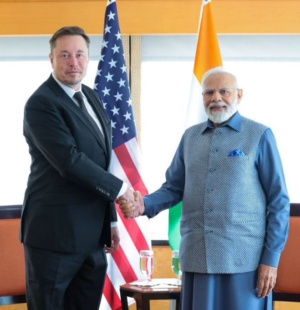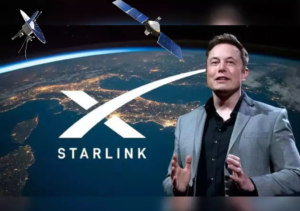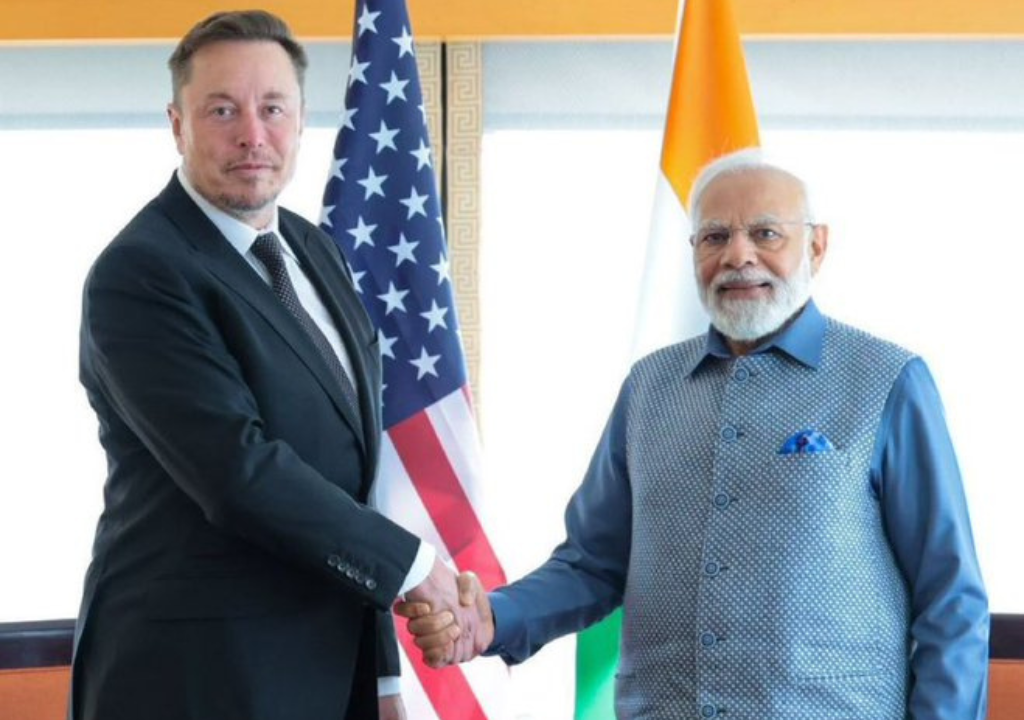Introduction
India-US tech partnership took a significant step forward as Prime Minister Narendra Modi held a phone conversation with tech entrepreneur Elon Musk. The two leaders revisited topics discussed during their Washington meeting earlier this year, focusing on opportunities for collaboration in electric vehicles, satellite internet, and advanced manufacturing. As the US-China trade war intensifies, American tech giants are seeking alternate manufacturing hubs—and India is emerging as a leading contender. Musk’s companies, particularly Tesla and Starlink, are reportedly preparing for their long-anticipated entry into the Indian market. This conversation could signal a pivotal shift in global tech alliances and industrial strategies in the face of rising geopolitical uncertainty.
What Was the Context Behind the Call?
The timing of the phone call is crucial. The United States and China are locked in a spiraling trade war, imposing harsh tariffs on each other’s goods. The US has slapped a 245% tariff on all Chinese imports, while China responded with a 125% retaliatory tariff—a direct blow to global supply chains.
American technology firms, many of which manufacture in China, are now exploring new options. India, with its growing manufacturing infrastructure, relatively lower labor costs, and strategic global alignment, is fast becoming a preferred alternative.
PM Modi and Elon Musk’s Conversation: What Was Discussed?
Prime Minister Modi, sharing the update on social media platform X (formerly Twitter), noted that he had a “productive conversation” with Elon Musk. The two discussed the “immense potential” of tech and innovation partnerships between India-US Tech Partnership.
“India remains committed to advancing our partnerships with the US in these domains,” PM Modi wrote.
Their discussion builds on previous engagements and marks a shared vision to deepen collaboration across high-impact sectors like electric mobility, satellite internet, and AI-powered solutions.

India-US Tech Partnership: Why It Matters Now
As traditional manufacturing hubs become unstable due to rising protectionism, the India-US tech partnership presents a strategic opportunity for both nations. India can offer scale, talent, and a democratic regulatory framework. For the US, India provides a critical counterweight to China and an access point to the world’s largest internet-using population.
With Elon Musk’s Tesla and Starlink at the forefront of this possible shift, the partnership also signals the beginning of a new tech axis that blends innovation, security, and strategic cooperation.
Tesla’s Entry Into India: Back on Track?
Tesla has been cautious about its India entry due to high import tariffs. However, after Modi and Musk’s meeting in Washington, signs of progress emerged. In early 2025, Tesla posted over a dozen job listings in India, including for backend engineers and retail positions.
Key developments:
- The Indian government slashed customs duties on electric vehicles over $40,000 from 110% to 70%.
- New EV policies mandate minimum $500 million investment and local manufacturing setup for import duty benefits.
Tesla is now seen as preparing a local entry strategy, balancing cost, scale, and policy compliance.
Links Suggested: India-Sri Lanka Relations : 5 Strategic Wins for Both Nations
Starlink in India: A Challenge or Opportunity?
Elon Musk also hopes to bring Starlink’s satellite internet service to India. While the demand is high—India has the world’s largest base of internet users—Starlink faces several hurdles:
Regulatory Challenges
- India requires strict compliance with security protocols for satellite communication.
- Until recently, the spectrum allocation policy for satellite services was based on auctions, which Musk publicly criticized.
Recent Policy Shifts
India has since shifted to a non-auction spectrum assignment model, offering a window of opportunity for Starlink.
Market Dynamics
- Starlink will compete with Reliance Jio, Airtel, and Bharti Group, which dominate satellite and broadband markets.
- With 7,000+ active satellites, Starlink currently serves around 4.6 million global users, but India’s low-cost data model could pose a pricing challenge.

US-China Trade War: Why India Is Gaining Ground
The ongoing trade dispute has exposed the risks of overdependence on China for manufacturing. With tariffs driving up production costs, companies like Apple, Dell, and Tesla are exploring India as a “China Plus One” strategy.
India’s advantages:
- Large skilled workforce
- Stable democratic governance
- Incentives for local manufacturing (PLI Schemes)
- Growing consumer base for EVs and mobile devices
Links Suggested: India-China Trade War: Can India Adopt Trump’s Economic Playbook?
Strategic Implications for India and the US
The deepening India-US tech partnership has implications beyond commerce:
- Defence and security cooperation may expand through joint R&D in cyber tech and aerospace.
- Digital infrastructure projects could be co-developed for South Asia and African markets.
- AI and semiconductor collaboration may accelerate, building on recent India-US iCET (Initiative on Critical and Emerging Technologies) framework.
What’s Next for Tesla and Starlink in India?
If discussions translate into action:
- Tesla may announce a factory in one of India’s manufacturing hubs like Gujarat, Tamil Nadu, or Maharashtra.
- Starlink may receive approval to pilot services in rural regions with poor internet access.
- Joint ventures or MoUs may be signed by mid-2025 to formalize the India-US innovation corridor.
Conclusion
The phone conversation between PM Modi and Elon Musk is more than just a diplomatic courtesy—it is a reflection of a strategic alignment in tech, trade, and innovation. As the India-US tech partnership strengthens in the backdrop of global tensions, India is well-positioned to become the next big destination for high-tech manufacturing and space-based internet services. What follows next could define not only India’s digital economy but also the global power balance in emerging technologies.

